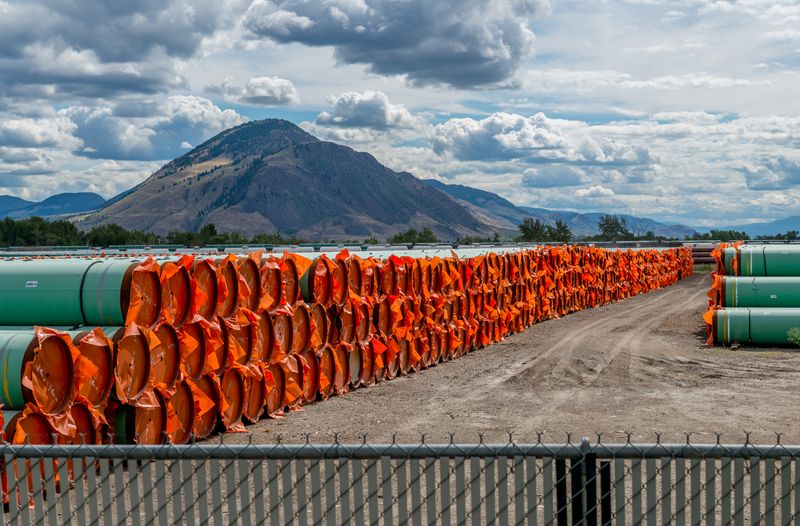By Nia Williams
CALGARY, Alberta (Reuters) -Canada said on Friday it will halt any further public funding for the Trans Mountain oil pipeline expansion, after the government-owned company behind the project said costs had surged 70% to C$21.4 billion ($16.8 billion).
Trans Mountain Corp (TMC) also delayed the finish date of the expansion by a further nine months, dealing another blow to a project already best by regulatory delays and opposition.
With the latest cost overrun, the government has told TMC to secure the necessary financing from public debt markets or financial institutions, Finance Minister Chrystia Freeland said.
"I want to assure Canadians that there will be no additional public money invested in TMC," Freeland added.
The government has engaged BMO Capital Markets and TD Securities to provide financial advice and Freeland said the two advisers confirmed the project remains commercially viable and public financing for the project is a feasible option. The expansion project is underpinned by 20-year shipper commitments.
TMC blamed the higher cost on the impact of the COVID-19 pandemic and extreme weather in British Columbia, which temporarily shut down flows on the existing Trans Mountain pipeline in November.
The company now expects to finish the expansion in the third quarter of 2023, when it will nearly triple the capacity of the pipeline running from Alberta to the Pacific Coast to 890,000 barrels per day. That would be a boost for Canada's oil producers, which are keen to export more crude.
But since the start, the project has faced several challenges, including opposition from indigenous peoples and environmentalists. In 2018, the Canadian government bought it for C$4.5 billion to help it get finished.
"While like everyone we are disappointed... we remain fully supportive of this world-class infrastructure project which is vital to Canada’s long-term economic success and energy security," said Mark Little, chief executive of Suncor Energy (NYSE:SU), one of Canada's largest oil companies and a shipper on the line.
The previous cost estimate, made in February 2020, was C$12.6 billion, while in 2017 it was pegged at C$7.4 billion. The new estimate includes the cost of all known enhancements, changes, delays and financing.
The Canadian government does not plan to be the long-term owner of the pipeline, and expects to launch a sale process in due course.
TMC said Chief Executive Ian Anderson will retire from the company and its board, effective April 1. He said the progress made over the two years was "remarkable" considering the global pandemic, wildfires and flooding in British Columbia.
"This project was crazy from a climate perspective when it was supposed to cost C$7.4 billion, but at C$21.4 billion and rising it is now economic madness," said Keith Stewart, a strategist for Greenpeace Canada.

"It's time to cut our losses on this white elephant."
($1 = 1.2749 Canadian dollars)